How to Use Parsley for Digestion and Detox
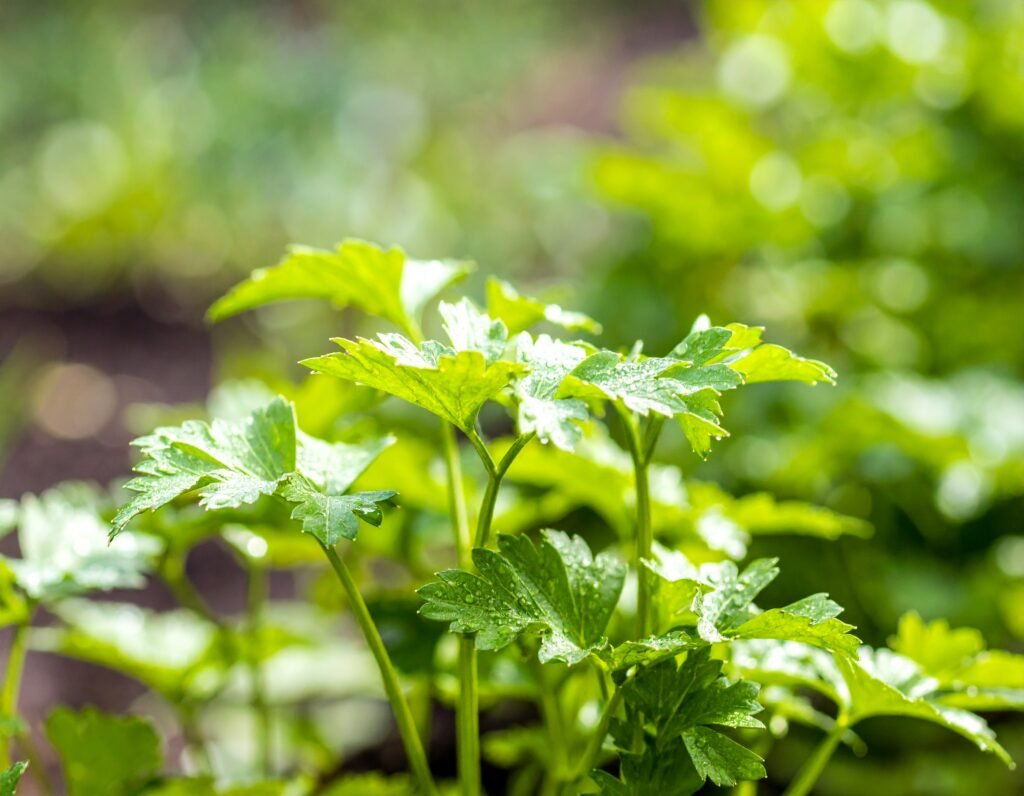
Often overlooked as a simple garnish, parsley (Petroselinum crispum) is actually a powerhouse herb for digestion and detoxification. Packed with vitamins, minerals, and cleansing compounds, this bright green herb supports your liver, kidneys, and gut—all while freshening your breath. Whether chopped fresh into food or brewed into tea using the root, parsley gently stimulates your body’s natural detox pathways.
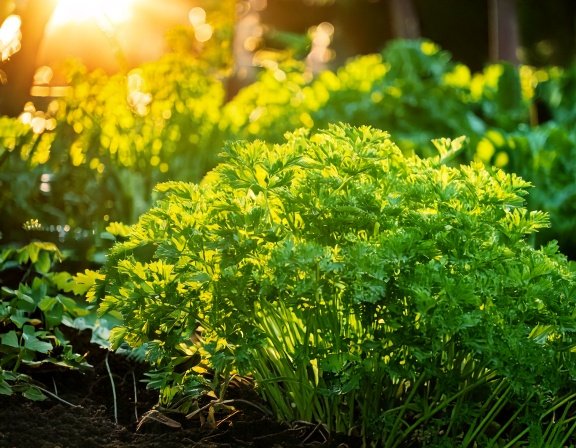
Parsley for Daily Cleansing and Digestive Strength
Parsley is humble but mighty. Its fresh leaves keep digestion strong and meals vibrant, while the root offers deep detoxification. Add it to your plate or teacup to gently support your body’s natural rhythm of cleansing and restoration.
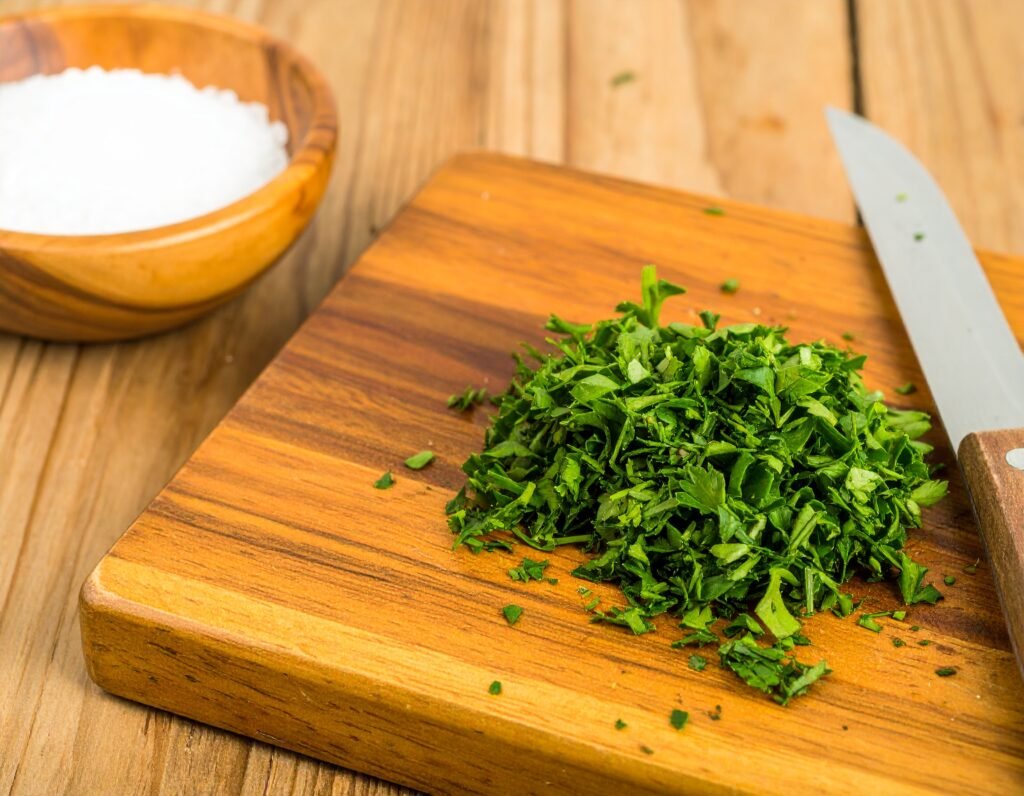
Culinary Uses
Parsley is more than a garnish—it’s a vibrant, nutrient-rich herb that brightens both flavor and presentation in countless dishes. Its fresh, slightly peppery taste complements almost any cuisine, from Mediterranean and Middle Eastern to modern wellness-inspired recipes. Packed with vitamins A, C, and K, as well as chlorophyll and antioxidants, parsley supports detoxification and adds a clean, green note to meals.
Use chopped fresh parsley to finish soups, stews, and roasted vegetables, or stir it into grains, salads, and dressings for a burst of freshness. Flat-leaf (Italian) parsley is best for cooking thanks to its bold flavor, while curly parsley adds texture and visual appeal as a garnish. You can also blend it into pesto, green sauces, or smoothies for an extra dose of plant-powered vitality. Simple yet powerful, parsley turns ordinary dishes into vibrant, nourishing creations.
- Sprinkle on cooked grains, beans, or veggies
- Mix into salads, dressings, or tabbouleh
- Stir into soups just before serving
- Blend into green smoothies or pesto
Finessa: Plant-Based Gut & Liver Support
- Features Taraxacum, Silymarin (Milk Thistle), Cascara, Cynara (Artichoke), Turmeric, Licorice, Probiotics
- High in polyphenols and active plant compounds
- Crafted for gentle cleansing and total digestive harmony
Digestive Benefits
Parsley is a gentle yet powerful digestive aid that helps the body process food more efficiently and stay balanced after meals. Its natural enzymes and bitter compounds stimulate the production of stomach acid and bile, supporting smoother digestion and reducing bloating or gas. Parsley also acts as a mild diuretic, helping the body flush out excess water and waste—making it a perfect herb for digestive comfort and detox support.
A cup of parsley tea or a handful of fresh leaves in your meals can help calm the stomach and freshen the breath after eating. The chlorophyll in parsley also supports gut health by neutralizing toxins and balancing the body’s internal environment. In this section, we’ll explore simple, natural ways to use parsley to ease digestion, cleanse gently, and keep your system running smoothly day to day.
- Relieves gas and bloating
- Stimulates stomach acid and digestive enzymes
- Acts as a gentle diuretic to reduce water retention
- Freshens breath by killing odor-causing bacteria
Reverse Your Fatty Liver 100% Naturally
- Focuses on whole-food nutrition, natural detox, and science-backed protocols
- Incorporates plant-based remedies and gentle lifestyle changes
- Learn practical steps for liver health—no risky drugs or crash diets
Grower’s Tip: Parsley thrives in partial sun and moist soil. Clip outer stems regularly to keep it producing.
Parsley Root Tea for Kidney and Liver Support
Parsley root tea is an age-old remedy celebrated for its cleansing and restorative effects on the kidneys and liver. The root contains natural compounds—like apiol and myristicin—that support detoxification, stimulate urine flow, and help flush out toxins and excess fluids. This makes it an excellent herbal ally for reducing water retention, easing bloating, and promoting overall organ health. When used regularly, parsley root tea gently encourages the body’s natural purification process without depleting essential minerals.
The root of parsley is a traditional remedy for urinary health, kidney support, and full-body detoxification. It works as a mild diuretic and anti-inflammatory.
Get Started Now (Amazon)
Simple Parsley Root Tea Recipe:
Simmer 1–2 teaspoons of dried or freshly chopped parsley root in 1½ cups of water for about 10–15 minutes. Strain and enjoy warm. You can add a squeeze of lemon or a drizzle of honey to enhance flavor and boost cleansing benefits.
How to Use:
Drink one cup daily for a gentle detox or 2–3 times per week as ongoing kidney and liver support. For best results, pair with plenty of water throughout the day to help the body flush impurities effectively.
Tip: Fresh parsley root can also be blended into soups or broths for an easy way to incorporate its detoxifying properties into your diet. Always consult with a healthcare provider before using regularly if you’re pregnant or managing kidney conditions.
Root Tea Recipe:
1 tablespoon chopped fresh or dried parsley root
1.5 cups water
Simmer on low for 10–15 minutes, strain and sip warm 1–2x per day for 3–7 days
Detox Benefits:
Parsley is one of nature’s most effective and gentle detox herbs, helping the body cleanse from the inside out. Rich in chlorophyll, antioxidants, and essential nutrients, parsley supports the liver and kidneys—the body’s main filtration organs—by promoting the natural elimination of toxins and excess fluids. Its mild diuretic properties help reduce bloating and water retention, while its vitamin C and flavonoids protect cells from oxidative stress during detoxification.
Regular use of parsley in teas, juices, or meals helps flush out impurities, refresh the skin, and boost overall vitality. It also helps neutralize acids in the body and supports healthy blood circulation. Whether you enjoy it as a simple parsley-lemon water, a cleansing tea, or a bright addition to smoothies, this humble herb offers powerful daily detox support without harsh side effects.
Tip for Best Results: For gentle, consistent detox support, combine parsley with other cleansing herbs like dandelion, nettle, or lemon balm. Drink plenty of water throughout the day to assist the body’s natural cleansing cycle and keep energy levels balanced.
- Flushes excess fluids and uric acid
- Supports gentle liver and kidney cleansing
- Eases bloating and mild constipation
- May soothe mild urinary tract discomfort
Pro Tip: Combine parsley root with dandelion root or fennel seed for a stronger detox blend.
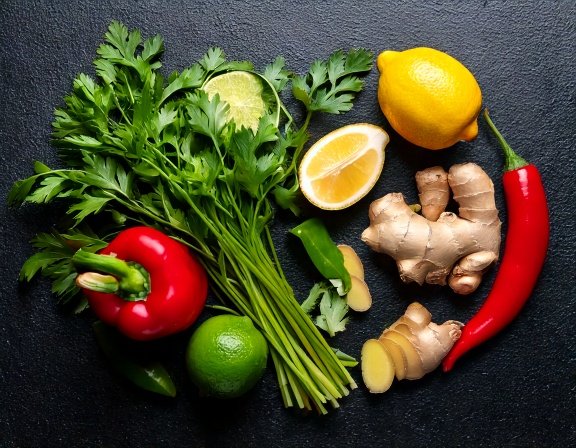
How to Use Parsley Safely and Effectively
Parsley root tea is an age-old remedy celebrated for its cleansing and restorative effects on the kidneys and liver. The root contains natural compounds—like apiol and myristicin—that support detoxification, stimulate urine flow, and help flush out toxins and excess fluids. This makes it an excellent herbal ally for reducing water retention, easing bloating, and promoting overall organ health. When used regularly, parsley root tea gently encourages the body’s natural purification process without depleting essential minerals.
Simple Parsley Root Tea Recipe:
Simmer 1–2 teaspoons of dried or freshly chopped parsley root in 1½ cups of water for about 10–15 minutes. Strain and enjoy warm. You can add a squeeze of lemon or a drizzle of honey to enhance flavor and boost cleansing benefits.
How to Use:
Drink one cup daily for a gentle detox or 2–3 times per week as ongoing kidney and liver support. For best results, pair with plenty of water throughout the day to help the body flush impurities effectively.
Tip: Fresh parsley root can also be blended into soups or broths for an easy way to incorporate its detoxifying properties into your diet. Always consult with a healthcare provider before using regularly if you’re pregnant or managing kidney conditions.
Parsley is generally safe when used as a food or in short herbal infusions, but large amounts (especially concentrated root) should be used with care.
Did You Know?
Parsley’s name comes from Greek “petroselinon,” meaning “rock celery”—a nod to its love of rocky soils and its botanical cousin, celery.
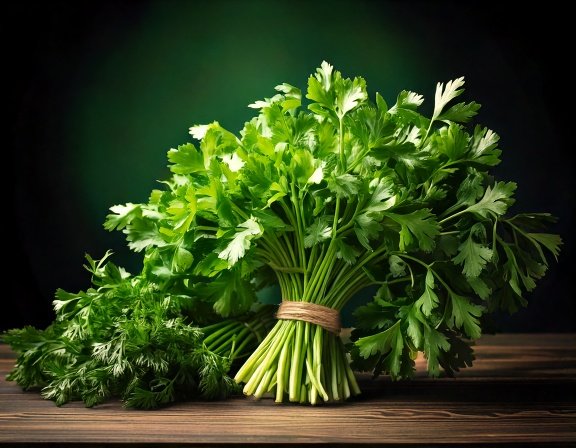
Buy Now
Want More Herbal Gardening Tips?
Subscribe to Health Intel Daily